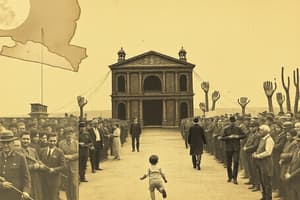Podcast
Questions and Answers
What is the correct past simple form of the verb 'to go'?
What is the correct past simple form of the verb 'to go'?
- went (correct)
- gone
- goed
- go
Which signal word is typically associated with the past simple tense?
Which signal word is typically associated with the past simple tense?
- Yesterday (correct)
- As
- While
- At that time
Identify the correct structure for forming a past continuous sentence.
Identify the correct structure for forming a past continuous sentence.
- Subject + is/are + verb + -ing
- Subject + was/were + verb + -ing (correct)
- Subject + past form of the verb
- Subject + verb + -ed
Which of the following correctly describes an action in the past continuous tense?
Which of the following correctly describes an action in the past continuous tense?
Which of these options indicates a common mistake in using past continuous tense?
Which of these options indicates a common mistake in using past continuous tense?
What is the correct application of the past simple tense?
What is the correct application of the past simple tense?
Which pair of actions best illustrates simultaneous actions in past continuous?
Which pair of actions best illustrates simultaneous actions in past continuous?
When should the auxiliary verb be included in a past continuous construction?
When should the auxiliary verb be included in a past continuous construction?
Which of the following sentences correctly uses the past simple tense?
Which of the following sentences correctly uses the past simple tense?
Flashcards are hidden until you start studying
Study Notes
Past Simple and Past Continuous Tense
Form and Structure
-
Past Simple:
- Regular verbs: base + -ed (e.g., walk → walked)
- Irregular verbs: unique past forms (e.g., go → went)
- Structure: Subject + past form of the verb (e.g., She walked to the store.)
-
Past Continuous:
- Structure: Subject + was/were + verb + -ing (e.g., They were playing soccer.)
- Used for actions in progress at a specific time in the past.
Signal Words
-
Past Simple:
- Yesterday
- Last week/month/year
- In 2010
- A specific time (e.g., at 5 PM)
-
Past Continuous:
- While
- When
- As
- At that time
Usage Rules
-
Past Simple:
- Describes completed actions in the past.
- Lists past events sequentially.
- Used for habits or repeated actions in the past.
-
Past Continuous:
- Describes ongoing actions that were happening at a specific moment in the past.
- Sets the scene in narratives or background for another action.
- Used to show simultaneous actions (e.g., I was reading while he was cooking).
Common Mistakes
-
Confusing the two tenses:
- Using past simple for ongoing actions (e.g., Incorrect: I watched TV when I was cooking. → Correct: I was watching TV when I was cooking.)
-
Neglecting auxiliary verbs in past continuous:
- Example: Incorrect: She playing soccer. → Correct: She was playing soccer.
-
Forgetting to adjust the subject-verb agreement with "was/were":
- Example: Incorrect: They was happy. → Correct: They were happy.
-
Applying past simple forms to irregular verbs incorrectly.
Past Simple Tense
- Describes completed actions in the past.
- Used for lists of past events in chronological order.
- Used for past habits or repeated actions.
- Use base form of the verb + -ed for regular verbs.
- Use unique past form for irregular verbs.
- Subject + Past form of the verb (e.g., She walked to the store)
Past Continuous Tense
- Describes ongoing actions at a specific time in the past.
- Used to set the scene in narratives.
- Used to show simultaneous actions.
- Structure: subject + was/were + verb + -ing (e.g., They were playing soccer)
Signal Words
- Past Simple: yesterday, last week/month/year, in 2010, at a specific time (e.g., at 5 PM).
- Past Continuous: while, when, as, at that time.
Common Mistakes
-
Confusing the two tenses:
- Using past simple for ongoing actions (e.g., Incorrect: I watched TV when I was cooking.→ Correct: I was watching TV when I was cooking.)
-
Neglecting auxiliary verbs in past continuous:
- Example: Incorrect: She playing soccer.→ Correct: She was playing soccer.
-
Forgetting to adjust the subject-verb agreement with "was/were":
- Example: Incorrect: They was happy.→ Correct: They were happy.
-
Applying past simple forms to irregular verbs incorrectly.
Studying That Suits You
Use AI to generate personalized quizzes and flashcards to suit your learning preferences.




